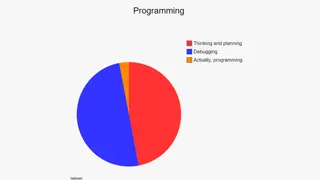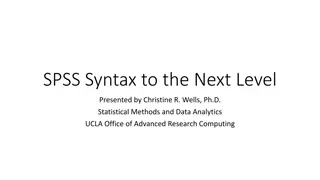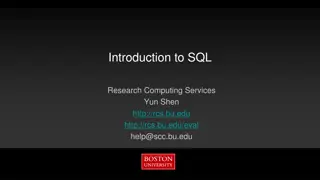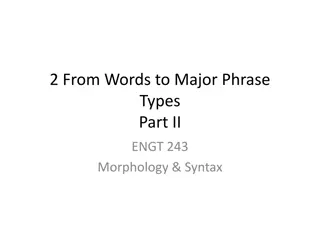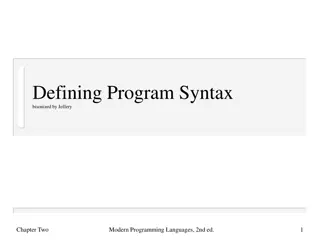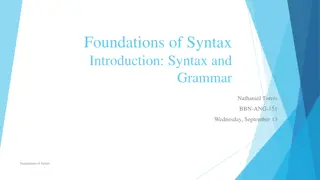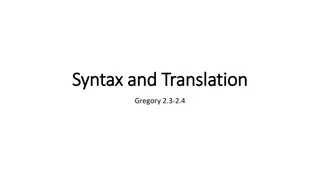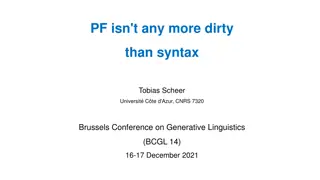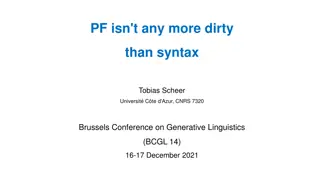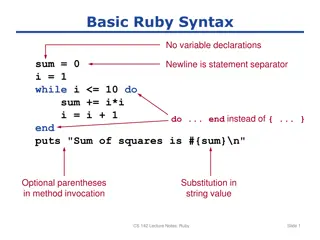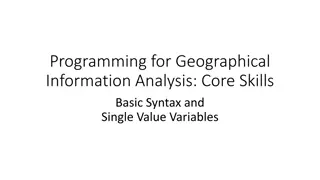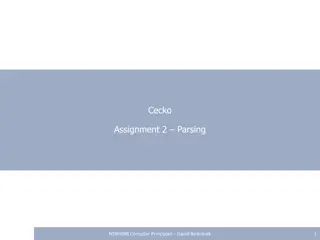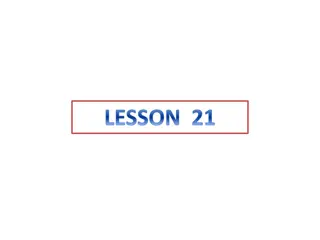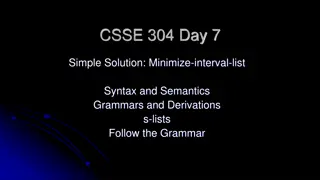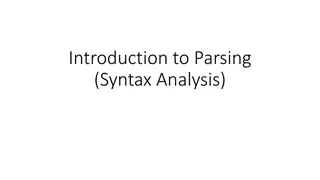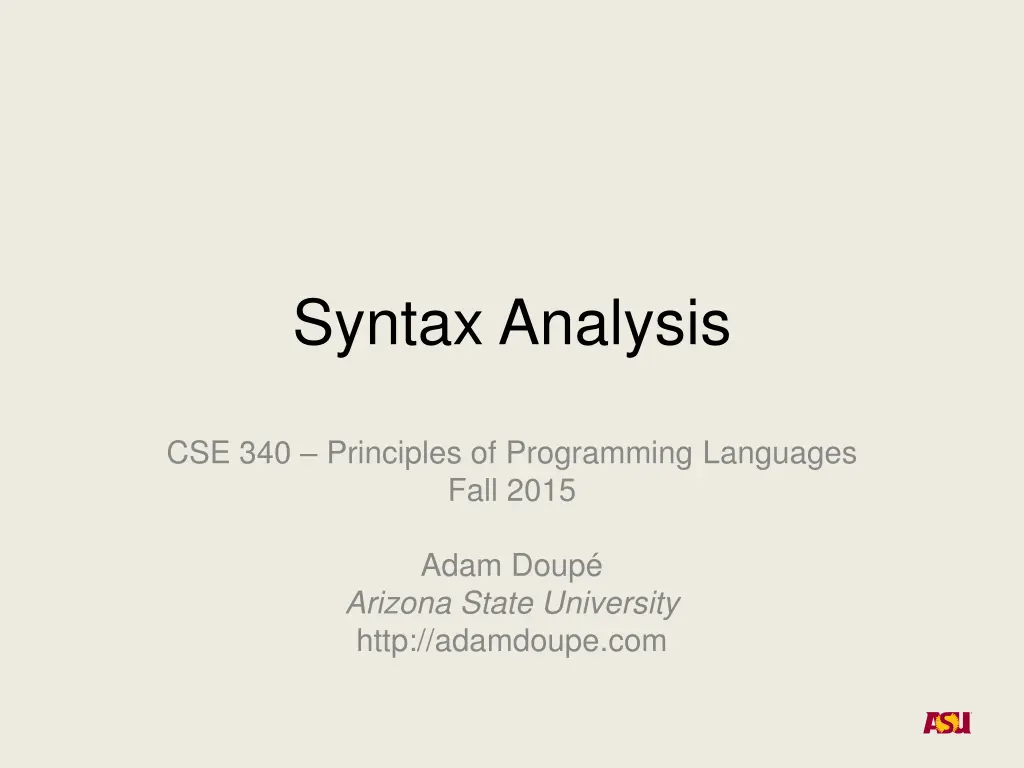
Principles of Programming Languages Syntax Analysis
Learn about syntax analysis in CSE 340 Principles of Programming Languages with Adam Doup at Arizona State University in Fall 2015. Explore the transformation of tokens into meaningful sequences, the use of regular expressions, and the limitations of regular languages. Discover the syntax for context-free grammars and examples like matching parentheses. Dive into derivations of context-free grammars in this informative content.
Uploaded on | 1 Views
Download Presentation

Please find below an Image/Link to download the presentation.
The content on the website is provided AS IS for your information and personal use only. It may not be sold, licensed, or shared on other websites without obtaining consent from the author. If you encounter any issues during the download, it is possible that the publisher has removed the file from their server.
You are allowed to download the files provided on this website for personal or commercial use, subject to the condition that they are used lawfully. All files are the property of their respective owners.
The content on the website is provided AS IS for your information and personal use only. It may not be sold, licensed, or shared on other websites without obtaining consent from the author.
E N D
Presentation Transcript
Syntax Analysis CSE 340 Principles of Programming Languages Fall 2015 Adam Doup Arizona State University http://adamdoupe.com
Syntax Analysis The goal of syntax analysis is to transform the sequence of tokens from the lexer into something useful However, we need a way to specify and check if the sequence of tokens is valid NUM PLUS NUM DECIMAL DOT NUM ID DOT ID DOT DOT DOT NUM ID DOT ID 2 Adam Doup , Principles of Programming Languages
Using Regular Expressions PROGRAM = STATEMENT* STATEMENT = EXPRESSION | IF_STMT | WHILE_STMT | OP = + | - | * | / EXPRESSION = (NUM | ID | DECIMAL) OP (NUM | ID | DECIMAL) 5 + 10 foo - bar 1 + 2 + 3 3 Adam Doup , Principles of Programming Languages
Using Regular Expressions Regular expressions are not sufficient to capture all programming constructs We will not go into the details in this class, but the reason is that regular languages (the set of all languages that can be described by regular expressions) cannot express languages with properties that we care about How to write a regular expression for matching parenthesis? L(R) = {?, (), (()), ((())), } Regular expressions (as we have defined them in this class) have no concept of counting (to ensure balanced parenthesis), therefore it is impossible to create R 4 Adam Doup , Principles of Programming Languages
Context-Free Grammars Syntax for context-free grammars Each row is called a production Non-terminals on the left Right arrow Non-terminals and terminals on the right Non-terminals will start with an upper case in our examples, terminals will be lowercase and are tokens S will typically be the starting non-terminal Example for matching parenthesis S ? S ( S ) Can also write more succinctly by combining production rules with the same starting non-terminals S ( S ) | ? 5 Adam Doup , Principles of Programming Languages
CFG Example S ( S ) | ? Derivations of the CFG S ? S ( S ) ( ? ) () S ( S) ( ( S ) ) ( ( ? ) ) (()) 6 Adam Doup , Principles of Programming Languages
CFG Example Exp Exp + Exp Exp Exp * Exp Exp NUM Exp Exp * Exp Exp * 3 Exp + Exp * 3 Exp + 2 * 3 1 + 2 * 3 8 Adam Doup , Principles of Programming Languages
Leftmost Derivation Always expand the leftmost nonterminal Exp Exp + Exp Exp Exp * Exp Exp NUM Is this a leftmost derivation? Exp Exp * Exp Exp * 3 Exp + Exp * 3 Exp + 2 * 3 1 + 2 * 3 Exp Exp * Exp Exp + Exp * Exp 1 + Exp * Exp 1 + 2 * Exp 1 + 2 * 3 9 Adam Doup , Principles of Programming Languages
Rightmost Derivation Always expand the rightmost nonterminal Exp Exp + Exp Exp Exp * Exp Exp NUM Exp Exp * Exp Exp * 3 Exp + Exp * 3 Exp + 2 * 3 1 + 2 * 3 10 Adam Doup , Principles of Programming Languages
Parse Tree We can also represent derivations using a parse tree May sound familiar Parse Tree Tokens Bytes Lexer Parser Source 11 Adam Doup , Principles of Programming Languages
Parse Tree Exp Exp * Exp Exp * 3 Exp + Exp * 3 Exp + 2 * 3 1 + 2 * 3 Exp Exp * Exp Exp + Exp 3 1 2 12 Adam Doup , Principles of Programming Languages
Parsing Derivations and parse tree can show how to generate strings that are in the language described by the grammar However, we need to turn a sequence of tokens into a parse tree Parsing is the process of determining the derivation or parse tree from a sequence of tokens Two major parsing problems: Ambiguous grammars Efficient parsing 13 Adam Doup , Principles of Programming Languages
Ambiguous Grammars Exp Exp + Exp Exp Exp * Exp Exp NUM How to parse 1 + 2 * 3? Exp Exp * Exp Exp + Exp * Exp 1 + Exp * Exp 1 + 2 * Exp 1 + 2 * 3 Exp Exp + Exp 1 + Exp 1 + Exp * Exp 1 + 2 * Exp 1 + 2 * 3 14 Adam Doup , Principles of Programming Languages
Ambiguous Grammars 1 + 2 * 3 Exp Exp Exp * Exp + Exp Exp Exp + Exp 3 1 Exp * Exp 1 2 2 3 15 Adam Doup , Principles of Programming Languages
Ambiguous Grammars A grammar is ambiguous if there exists two different leftmost derivations, or two different rightmost derivations, or two different parse trees for any string in the grammar Is English ambiguous? I saw a man on a hill with a telescope. Ambiguity is not desirable in a programming language Unlike in English, we don't want the compiler to read your mind and try to infer what you meant 16 Adam Doup , Principles of Programming Languages
Parsing Approaches Various ways to turn strings into parse tree Bottom-up parsing, where you start from the terminals and work your way up Top-down parsing, where you start from the starting non-terminal and work your way down In this class, we will focus exclusively on top-down parsing 17 Adam Doup , Principles of Programming Languages
Top-Down Parsing S A | B | C A a B Bb | b C Cc | ? parse_S() { t_type = getToken() if (t_type == a) { ungetToken() parse_A() check_eof() } else if (t_type == b) { ungetToken() parse_B() check_eof() } else if (t_type == c) { ungetToken() parse_C() check_eof() } else if (t_type == eof) { // do EOF stuff } else { syntax_error() } } 18 Adam Doup , Principles of Programming Languages
Predictive Recursive Descent Parsers Predictive recursive descent parser are efficient top-down parsers Efficient because they only look at next token, no backtracking/guessing To determine if a language allows a predictive recursive descent parser, we need to define the following functions FIRST( ), where is a sequence of grammar symbols (non- terminals, terminals, and ?) FIRST( ) returns the set of terminals and ? that begin strings derived from FOLLOW(A), where A is a non-terminal FOLLOW(A) returns the set of terminals and $ (end of file) that can appear immediately after the non-terminal A 19 Adam Doup , Principles of Programming Languages
FIRST() Example S A | B | C A a B Bb | b C Cc | ? FIRST(S) = { a, b, c, ? } FIRST(A) = { a } FIRST(B) = { b } FIRST(C) = { ?, c } 20 Adam Doup , Principles of Programming Languages
Calculating FIRST() First, start out with empty FIRST() sets for all non-terminals in the grammar Then, apply the following rules until the FIRST() sets do not change: 1. FIRST(x) = { x } if x is a terminal 2. FIRST(?) = { ? } 3. If A B is a production rule, then add FIRST(B) { ? } to FIRST(A) 4. If A B0B1B2 BiBi+1 Bk and ? FIRST(B0) and ? FIRST(B1) and ? FIRST(B2) and and ? FIRST(Bi), then add FIRST(Bi+1) { ? } to FIRST(A) 5. If A B0B1B2 Bk and FIRST(B0) and ? FIRST(B1) and ? FIRST(B2) and and ? FIRST(Bk), then add to FIRST(A) 21 Adam Doup , Principles of Programming Languages
Calculating FIRST Sets S ABCD A CD | aA B b C cC | ? D dD | ? INITIAL FIRST(S) = {} FIRST(S) = { } FIRST(S) = { a } FIRST(S) = { a, c, d, b} FIRST(S) = { a, c, d, b } FIRST(A) = {} FIRST(A) = { a } FIRST(A) = { a, c, d, ? } FIRST(A) = { a, c, d, ? } FIRST(A) = { a, c, d, ? } FIRST(B) = {} FIRST(B) = { b } FIRST(B) = { b } FIRST(B) = { b } FIRST(B) = { b } FIRST(C) = {} FIRST(C) = { c, ? } FIRST(C) = { c, ? } FIRST(C) = { c, ? } FIRST(C) = { c, ? } FIRST(D) = {} FIRST(D) = { d, ? } FIRST(D) = { d, ? } FIRST(D) = { d, ? } FIRST(D) = { d, ? } 23 Adam Doup , Principles of Programming Languages
Calculating FIRST Sets S ABCD A CD | aA B b C cC | ? D dD | ? INITIAL FIRST(S) = {} FIRST(S) = { } FIRST(S) = { a } FIRST(S) = { a, c, d, b} FIRST(S) = { a, c, d, b } FIRST(A) = {} FIRST(A) = { a } FIRST(A) = { a, c, d, ? } FIRST(A) = { a, c, d, ? } FIRST(A) = { a, c, d, ? } FIRST(B) = {} FIRST(B) = { b } FIRST(B) = { b } FIRST(B) = { b } FIRST(B) = { b } FIRST(C) = {} FIRST(C) = { c, ? } FIRST(C) = { c, ? } FIRST(C) = { c, ? } FIRST(C) = { c, ? } FIRST(D) = {} FIRST(D) = { d, ? } FIRST(D) = { d, ? } FIRST(D) = { d, ? } FIRST(D) = { d, ? } 24 Adam Doup , Principles of Programming Languages
1. 2. 3. 4. FIRST(x) = { x } if x is a terminal FIRST(?) = { ? } If A B is a production rule, then add FIRST(B) { ? } to FIRST(A) If A B0B1B2 BiBi+1 Bk and ? FIRST(B0) and ? FIRST(B1) and ? FIRST(B2) and and ? FIRST(Bi), then add FIRST(Bi+1) { ? } to FIRST(A) If A B0B1B2 Bk and FIRST(B0) and ? FIRST(B1) and ? FIRST(B2) and and ? FIRST(Bk), then add to FIRST(A) 5. S ABCD A CD | aA B b C cC | ? D dD | ? INITIAL FIRST(S) = {} FIRST(S) = { } FIRST(S) = { a } FIRST(S) = { a, c, d, b} FIRST(S) = { a, c, d, b } FIRST(A) = {} FIRST(A) = { a } FIRST(A) = { a, c, d, ? } FIRST(A) = { a, c, d, ? } FIRST(A) = { a, c, d, ? } FIRST(B) = {} FIRST(B) = { b } FIRST(B) = { b } FIRST(B) = { b } FIRST(B) = { b } FIRST(C) = {} FIRST(C) = { c, ? } FIRST(C) = { c, ? } FIRST(C) = { c, ? } FIRST(C) = { c, ? } FIRST(D) = {} FIRST(D) = { d, ? } FIRST(D) = { d, ? } FIRST(D) = { d, ? } FIRST(D) = { d, ? } 25 Adam Doup , Principles of Programming Languages
FOLLOW() Example FOLLOW(A), where A is a non-terminal, returns the set of terminals and $ (end of file) that can appear immediately after the non-terminal A S A | B | C A a B Bb | b C Cc | ? FOLLOW(S) = { $ } FOLLOW(A) = { $ } FOLLOW(B) = { b, $ } FOLLOW(C) = { c, $ } 26 Adam Doup , Principles of Programming Languages
Calculating FOLLOW(A) First, calculate FIRST sets. Then, initialize empty FOLLOW sets for all non-terminals in the grammar Finally, apply the following rules until the FOLLOW sets do not change: 1. If S is the starting symbol of the grammar, then add $ to FOLLOW(S) 2. If B A, then add FOLLOW(B) to FOLLOW(A) 3. If B AC0C1C2 Ck and ? FIRST(C0) and ? FIRST(C1) and ? FIRST(C2) and and ? FIRST(Ck), then add FOLLOW(B) to FOLLOW(A) 4. If B AC0C1C2 Ck, then add FIRST(C0) { ? } to FOLLOW(A) 5. If B AC0C1C2 CiCi+1 Ck and ? FIRST(C0) and ? FIRST(C1) and ? FIRST(C2) and and ? FIRST(Ci), then add FIRST(Ci+1) { ? } to FOLLOW(A) 27 Adam Doup , Principles of Programming Languages
Calculating FOLLOW Sets S ABCD A CD | aA B b C cC | ? D dD | ? INITIAL FOLLOW(S) = {} FOLLOW(S) = { $ } FOLLOW(S) = { $ } FOLLOW(A) = {} FOLLOW(A) = { b } FOLLOW(A) = { b } FIRST(S) = { a, c, d, b } FIRST(A) = { a, c, d, ? } FIRST(B) = { b } FIRST(C) = { c, ? } FIRST(D) = { d, ? } FOLLOW(B) = {} FOLLOW(B) = { $, c, d } FOLLOW(B) = { $, c, d } FOLLOW(C) = {} FOLLOW(C) = { $, d, b } FOLLOW(C) = { $, d, b } FOLLOW(D) = {} FOLLOW(D) = { $, b } FOLLOW(D) = { $, b } 29 Adam Doup , Principles of Programming Languages
Calculating FOLLOW Sets S ABCD A CD | aA B b C cC | ? D dD | ? INITIAL FOLLOW(S) = {} FOLLOW(S) = { $ } FOLLOW(S) = { $ } FOLLOW(A) = {} FOLLOW(A) = { b } FOLLOW(A) = { b } FIRST(S) = { a, c, d, b } FIRST(A) = { a, c, d, ? } FIRST(B) = { b } FIRST(C) = { c, ? } FIRST(D) = { d, ? } FOLLOW(B) = {} FOLLOW(B) = { $, c, d } FOLLOW(B) = { $, c, d } FOLLOW(C) = {} FOLLOW(C) = { $, d, b } FOLLOW(C) = { $, d, b } FOLLOW(D) = {} FOLLOW(D) = { $, b } FOLLOW(D) = { $, b } 30 Adam Doup , Principles of Programming Languages
1. 2. 3. If S is the starting symbol of the grammar, then add $ to FOLLOW(S) If B A, then add FOLLOW(B) to FOLLOW(A) If B AC0C1C2 Ck and ? FIRST(C0) and ? FIRST(C1) and ? FIRST(C2) and and ? FIRST(Ck), then add FOLLOW(B) to FOLLOW(A) If B AC0C1C2 Ck, then add FIRST(C0) { ? } to FOLLOW(A) If B AC0C1C2 CiCi+1 Ck and ? FIRST(C0) and ? FIRST(C1) and ? FIRST(C2) and and ? FIRST(Ci), then add FIRST(Ci+1) { ? } to FOLLOW(A) 4. 5. S ABCD A CD | aA B b C cC | ? D dD | ? INITIAL FOLLOW(S) = {} FOLLOW(S) = { $ } FOLLOW(S) = { $ } FOLLOW(A) = {} FOLLOW(A) = { b } FOLLOW(A) = { b } FIRST(S) = { a, c, d, b } FIRST(A) = { a, c, d, ? } FIRST(B) = { b } FIRST(C) = { c, ? } FIRST(D) = { d, ? } FOLLOW(B) = {} FOLLOW(B) = { $, c, d } FOLLOW(B) = { $, c, d } FOLLOW(C) = {} FOLLOW(C) = { $, d, b } FOLLOW(C) = { $, d, b } FOLLOW(D) = {} FOLLOW(D) = { $, b } FOLLOW(D) = { $, b } 32 Adam Doup , Principles of Programming Languages
Predictive Recursive Descent Parsers At each parsing step, there is only one grammar rule that can be chosen, and there is no need for backtracking The conditions for a predictive parser are both of the following If A and A , then FIRST( ) FIRST( ) = If ? FIRST(A), then FIRST(A) FOLLOW(A) = 33 Adam Doup , Principles of Programming Languages
Creating a Predictive Recursive Descent Parser Create a CFG Calculate FIRST and FOLLOW sets Prove that CFG allows a Predictive Recursive Descent Parser Write the predictive recursive descent parser using the FIRST and FOLLOW sets 34 Adam Doup , Principles of Programming Languages
Email Addresses How to parse/validate email addresses? name @ domain.tld Turns out, it is not so simple "cse 340"@example.com customer/department=shipping@example.com "Abc@def"@example.com "Abc\@def"@example.com "Abc\"@example.com"@example.com test "example @hello" <test@example.com> In fact, a company called Mailgun, which provides email services as an API, released an open-source tool to validate email addresses, based on their experience with real-world email How did they implement their parser? A recursive descent parser https://github.com/mailgun/flanker 35 Adam Doup , Principles of Programming Languages
Email Address CFG quoted-string atom dot-atom whitespace Address Name-addr-rfc | Name-addr-lax | Addr-spec Name-addr-rfc Display-name-rfc Angle-addr-rfc | Angle-addr-rfc Display-name-rfc Word Display-name-rfc-list | whitespace Word Display-name-rfc-list Display-name-rfc-list whitespace Word Display-name-rfc-list | epsilon Angle-addr-rfc < Addr-spec > | whitespace < Addr-spec > | whitespace < Addr-spec > whitespace | < Addr- spec > whitespace Name-addr-lax Display-name-lax Angle-addr-lax | Angle-addr-lax Display-name-lax whitespace Word Display-name-lax-list whitespace | Word Display-name-lax-list whitespace Display-name-lax-list whitespace Word Display-name-lax-list | epsilon Angle-addr-lax Addr-spec | Addr-spec whitespace Addr-spec Local-part @ Domain | whitespace Local-part @ Domain | whitespace Local-part @ Domain whitespace | Local-part @ Domain whitespace Local-part dot-atom | quoted-string Domain dot-atom Word atom | quoted-string CFG taken from https://github.com/mailgun/flanker 36 Adam Doup , Principles of Programming Languages
Simplified Email Address CFG quoted-string (q-s) atom dot-atom (d-a) quoted-string-at (q-s-a) dot-atom-at (d-a-a) Address Name-addr | Addr-spec Name-addr Display-name Angle-addr | Angle-addr Display-name Word Display-name-list Display-name-list Word Display-name-list | ? Angle-addr < Addr-spec > Addr-spec d-a-a Domain | q-s-a Domain Domain d-a Word atom | q-s 37 Adam Doup , Principles of Programming Languages
Address Name-addr | Addr-spec Name-addr Display-name Angle-addr | Angle-addr Display-name Word Display-name-list Display-name-list Word Display-name-list | ? Angle-addr < Addr-spec > Addr-spec d-a-a Domain | q-s-a Domain Domain d-a Word atom | q-s FIRST INITIAL Address {} {} { d-a-a, q-s-a } { d-a-a, q-s-a, < } { d-a-a, q-s-a, <, atom, q-s } { d-a-a, q-s-a, <, atom, q-s } Name-addr {} {} { < } { <, atom, q-s } { <, atom, q-s } { <, atom, q-s } Display- name {} {} { atom, q-s } { atom, q-s } { atom, q-s } { atom, q-s } Display- name-list {} { ? } { ?, atom, q-s } { ?, atom, q-s } { ?, atom, q-s } { ?, atom, q-s } Angle-addr {} { < } { < } { < } { < } { < } Addr-spec {} { d-a-a, q-s-a } { d-a-a, q-s-a } { d-a-a, q-s-a } { d-a-a, q-s-a } { d-a-a, q-s-a } Domain {} { d-a } { d-a } { d-a } { d-a } { d-a } Word {} { atom, { atom, q-s } { atom, q-s } { atom, q-s } { atom, q-s } 39 Adam Doup , Principles of Programming Languages q-s }
FIRST(Address) = { d-a-a, q-s-a, <, atom, q-s } FIRST(Name-addr) = { <, atom, q-s } FIRST(Display-name) = { atom, q-s } FIRST(Display-name-list) = { ?, atom, q-s } FIRST(Angle-addr) = { < } FIRST(Addr-spec) = { d-a-a, q-s-a } FIRST(Domain) = { d-a } FIRST(Word) = { atom, q-s } Address Name-addr | Addr-spec Name-addr Display-name Angle-addr | Angle-addr Display-name Word Display-name-list Display-name-list Word Display-name-list | ? Angle-addr < Addr-spec > Addr-spec d-a-a Domain | q-s-a Domain Domain d-a Word atom | q-s FOLLOW INITIAL Address {} { $ } { $ } Name-addr {} { $ } { $ } Display-name {} { < } { < } Display-name-list {} { < } { < } Angle-addr {} { $ } { $ } Addr-spec {} { $, > } { $, > } Domain {} { $, > } { $, > } Word {} { atom, q-s, < } { atom, q-s, < } 40 Adam Doup , Principles of Programming Languages
Address Name-addr | Addr-spec Name-addr Display-name Angle-addr | Angle-addr Display-name Word Display-name-list Display-name-list Word Display-name-list | ? Angle-addr < Addr-spec > Addr-spec d-a-a Domain | q-s-a Domain Domain d-a Word atom | q-s FIRST(Address) = { d-a-a, q-s-a, <, atom, q-s } FIRST(Name-addr) = { <, atom, q-s } FIRST(Display-name) = { atom, q-s } FIRST(Display-name-list) = { ?, atom, q-s } FIRST(Angle-addr) = { < } FIRST(Addr-spec) = { d-a-a, q-s-a } FIRST(Domain) = { d-a } FIRST(Word) = { atom, q-s } FIRST(Name-addr) FIRST(Addr-spec) FOLLOW(Address) = { $ } FOLLOW(Name-addr) = { $ } FOLLOW(Display-name) = { < } FOLLOW(Display-name-list) = { < } FOLLOW(Angle-addr) = { $ } FOLLOW(Addr-spec) = { $, > } FOLLOW(Domain) = { $, > } FOLLOW(Word) = { atom, q-s, < } FIRST(Display-name Angle-addr) FIRST(Angle-addr) FIRST(Word Display-name-list) FIRST(?) FIRST(d-a-a Domain) FIRST(q-s-a Domain) FIRST(atom) FIRST(q-s) FIRST(Display-name-list) FOLLOW(Display-name- list) 41 Adam Doup , Principles of Programming Languages
FOLLOW(Address) = { $ } FOLLOW(Name-addr) = { $ } FOLLOW(Addr-spec) = { $, > } Address Name-addr | Addr-spec FIRST(Address) = { d-a-a, q-s-a, <, atom, q-s } FIRST(Name-addr) = { <, atom, q-s } FIRST(Addr-spec) = { d-a-a, q-s-a } parse_Address() { t_type = getToken(); // Check FIRST(Name-addr) if (t_type == < || t_type == atom || t_type == q-s ) { ungetToken(); parse_Name-addr(); printf("Address -> Name-addr"); } // Check FIRST(Addr-spec) else if (t_type == d-a-a || t_type == q-s-a) { ungetToken(); parse_Addr-spec(); printf("Address -> Addr-spec"); } else { syntax_error(); } } 42 Adam Doup , Principles of Programming Languages
FOLLOW(Name-addr) = { $ } FOLLOW(Display-name) = { < } FOLLOW(Angle-addr) = { $ } Name-addr Display-name Angle-addr | Angle- addr FIRST(Name-addr) = { <, atom, q-s } FIRST(Display-name) = { atom, q-s } FIRST(Angle-addr) = { < } parse_Name-addr() { t_type = getToken(); // Check FIRST(Display-name Angle-addr) if (t_type == atom || t_type == q-s) { ungetToken(); parse_Display-name(); parse_Angle-addr(); printf("Name-addr -> Display-name Angle-addr"); } // Check FIRST(Angle-addr) else if (t_type == <) { ungetToken(); parse_Angle-addr(); printf("Name-addr -> Angle-addr"); } else { syntax_error(); } } 43 Adam Doup , Principles of Programming Languages
Display-name Word Display-name-list FIRST(Display-name) = { atom, q-s } FIRST(Display-name-list) = { ?, atom, q-s } FIRST(Word) = { atom, q-s } FOLLOW(Display-name) = { < } FOLLOW(Display-name-list) = { < } FOLLOW(Word) = { atom, q-s, < } parse_Display-name() { t_type = getToken(); // Check FIRST(Word Display-name-list) if (t_type == atom || t_type == q-s) { ungetToken(); parse_Word(); parse_Display-name-list(); printf("Display-name -> Word Display-name-list"); } else { syntax_error(); } } 44 Adam Doup , Principles of Programming Languages
Display-name-list Word Display-name-list | ? FIRST(Display-name-list) = { ?, atom, q-s } FIRST(Word) = { atom, q-s } FOLLOW(Display-name-list) = { < } FOLLOW(Word) = { atom, q-s, < } parse_Display-name-list() { t_type = getToken(); // Check FIRST( Word Display-name-list) if (t_type == atom || t_type == q-s) { ungetToken(); parse_Word(); parse_Display-name-list(); printf("Display-name-list -> Word Display-name-list"); } // Check FOLLOW(Display-name-list) else if (t_type == <) { ungetToken(); printf("Display-name-list -> ?"); } else { syntax_error(); } } 45 Adam Doup , Principles of Programming Languages
Angle-addr < Addr-spec > FIRST(Angle-addr) = { < } FIRST(Addr-spec) = { d-a-a, q-s-a } FOLLOW(Angle-addr) = { $ } FOLLOW(Addr-spec) = { $, > } parse_Angle-addr() { t_type = getToken(); // Check FIRST(< Addr-spec >) if (t_type == <) { // ungetToken()? parse_Addr-spec(); t_type = getToken(); if (t_type != >) { syntax_error(); } printf("Angle-addr -> < Addr-spec >"); } else { syntax_error(); } } 46 Adam Doup , Principles of Programming Languages
Addr-spec d-a-a Domain | q-s-a Domain FIRST(Addr-spec) = { d-a-a, q-s-a } FIRST(Domain) = { d-a } FOLLOW(Addr-spec) = { $, > } FOLLOW(Domain) = { $, > } parse_Addr-spec() { t_type = getToken(); // Check FIRST(d-a-a Domain) if (t_type == d-a-a) { // ungetToken()? parse_Domain(); printf("Addr-spec -> d-a-a Domain"); } // Check FIRST(q-s-a Domain) else if (t_type == q-s-a) { parse_Domain(); printf("Addr-spec -> q-s-a Domain"); } else { syntax_error(); } } 47 Adam Doup , Principles of Programming Languages
Domain d-a FIRST(Domain) = { d-a } FOLLOW(Domain) = { $, > } parse_Domain() { t_type = getToken(); // Check FIRST(d-a) if (t_type == d-a) { printf("Domain -> d-a"); } else { syntax_error(); } } 48 Adam Doup , Principles of Programming Languages
Word atom | q-s FIRST(Word) = { atom, q-s } FOLLOW(Word) = { atom, q-s, < } parse_Word() { t_type = getToken(); // Check FIRST(atom) if (t_type == atom) { printf("Word -> atom"); } // Check FIRST(q-s) else if (t_type == q-s) { printf("Word -> q-s"); } else { syntax_error(); } } 49 Adam Doup , Principles of Programming Languages
Predictive Recursive Descent Parsers For every non-terminal A in the grammar, create a function called parse_A For each production rule A (where is a sequence of terminals and non-terminals), if getToken() FIRST( ) then choose the production rule A For every terminal and non-terminal a in , if a is a non- terminal call parse_a, if a is a terminal check that getToken() == a If ? FIRST( ), then check that getToken() FOLLOW(A), then choose the production A ? If getToken() FIRST(A), then syntax_error(), unless ? FIRST(A), then getToken() FOLLOW(A) is syntax_error() 50 Adam Doup , Principles of Programming Languages

